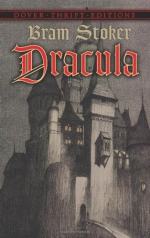is lying down, having a rest preparatory to his journey.
He goes to Amsterdam tonight, but says he returns
tomorrow night, that he only wants to make some arrangements
which can only be made personally. He is to stop
with me then, if he can. He says he has work
to do in London which may take him some time.
Poor old fellow! I fear that the strain of the
past week has broken down even his iron strength.
All the time of the burial he was, I could see, putting
some terrible restraint on himself. When it
was all over, we were standing beside Arthur, who,
poor fellow, was speaking of his part in the operation
where his blood had been transfused to his Lucy’s
veins. I could see Van Helsing’s face grow
white and purple by turns. Arthur was saying
that he felt since then as if they two had been really
married, and that she was his wife in the sight of
God. None of us said a word of the other operations,
and none of us ever shall. Arthur and Quincey
went away together to the station, and Van Helsing
and I came on here. The moment we were alone
in the carriage he gave way to a regular fit of hysterics.
He has denied to me since that it was hysterics,
and insisted that it was only his sense of humor asserting
itself under very terrible conditions. He laughed
till he cried, and I had to draw down the blinds lest
any one should see us and misjudge. And then
he cried, till he laughed again, and laughed and cried
together, just as a woman does. I tried to be
stern with him, as one is to a woman under the circumstances,
but it had no effect. Men and women are so different
in manifestations of nervous strength or weakness!
Then when his face grew grave and stern again I asked
him why his mirth, and why at such a time. His
reply was in a way characteristic of him, for it was
logical and forceful and mysterious. He said,
“Ah, you don’t comprehend, friend John.
Do not think that I am not sad, though I laugh.
See, I have cried even when the laugh did choke me.
But no more think that I am all sorry when I cry,
for the laugh he come just the same. Keep it
always with you that laughter who knock at your door
and say, ‘May I come in?’ is not true laughter.
No! He is a king, and he come when and how he
like. He ask no person, he choose no time of
suitability. He say, ‘I am here.’
Behold, in example I grieve my heart out for that so
sweet young girl. I give my blood for her, though
I am old and worn. I give my time, my skill,
my sleep. I let my other sufferers want that
she may have all. And yet I can laugh at her
very grave, laugh when the clay from the spade of
the sexton drop upon her coffin and say ’Thud,
thud!’ to my heart, till it send back the blood
from my cheek. My heart bleed for that poor
boy, that dear boy, so of the age of mine own boy
had I been so blessed that he live, and with his hair
and eyes the same.




